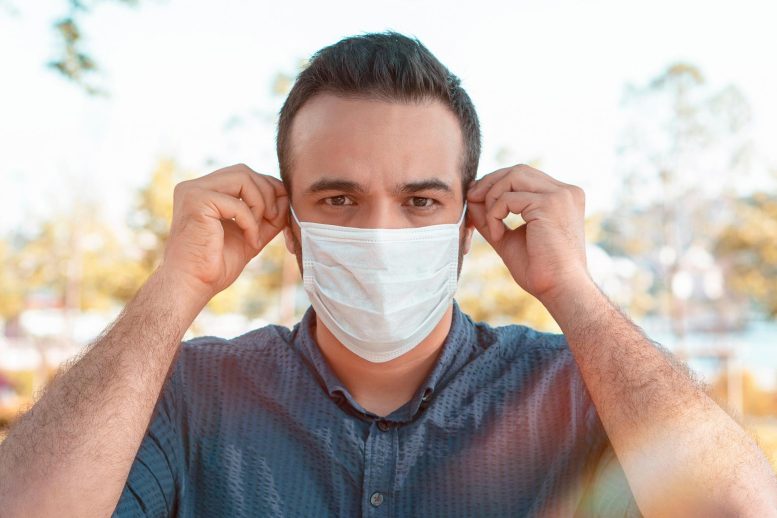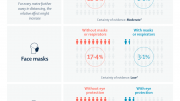
Healthcare epidemiologists and infectious disease experts from various healthcare systems argue that universal masking in healthcare settings is no longer necessary due to advancements and population immunity. They advocate for managing SARS-CoV-2 similarly to other respiratory viruses, utilizing masks during specific situations, and adapting policies based on the changing context of the pandemic.
Experts call for adapting policies to accommodate evolving circumstances.
According to healthcare epidemiologists and infectious disease specialists from various healthcare systems across Boston and beyond, the era of universal masking in healthcare facilities has come to an end. In a jointly written commentary featured in the Annals of Internal Medicine, experts from Mass General Brigham, Beth Israel Lahey Health, Tufts Medicine, VA Healthcare System Boston, and other healthcare systems across the nation explain the shifting scenario and circumstances of the pandemic and highlight the reasons why universal masking should no longer be mandatory in healthcare settings.
“While critically important in the earlier phases of the pandemic, we’ve entered a more stable phase, with substantial population-level immunity, durable protection against severe disease, a series of less virulent variants, and other important and favorable changes,” said corresponding author Erica S. Shenoy, MD, Ph.D., medical director of Infection Control for Mass General Brigham and an infectious diseases physician at Massachusetts General Hospital (MGH). “As conditions change, we need to re-evaluate our infection prevention policies, including masking requirements in healthcare settings, and adapt.”
In the commentary, the authors emphasize different phases of the pandemic and describe that while universal masking was justifiable before medical countermeasures were available, advancements and population immunity have changed the appropriateness of the policy. Highlighting a theme of constant and ongoing change, they review the rationale for initially expanding mask use in healthcare settings, the reasons why de-escalation is needed, and conditions that could prompt reconsideration of use of masks more widely again.
“After three years of universal masking in healthcare, the risk-benefit calculation has shifted,” said Shira Doron, MD, chief infection control officer for Tufts Medicine health system and hospital epidemiologist at Tufts Medical Center. “Masks do have downsides, such as impaired communication and disrupted human connection. We are at a stage of the pandemic where it now makes sense to end mandatory masking.”
Given advancements, the authors advocate for managing SARS-CoV-2 in a similar way to how other respiratory viruses are managed in healthcare settings. This includes ensuring healthcare personnel use masks (and eye protection) when engaging in activities that could generate splashes or sprays and having patients mask if they have respiratory symptoms.
“As the pandemic moves into an endemic phase, we need to transition prevention efforts to incorporate all respiratory viruses. Performing risk assessments and applying lessons learned from COVID-19, including about how to apply masking, will permit a more flexible, durable response now and in future seasons,” said co-author Sharon Wright, MD, MPH, chief infection prevention officer at Beth Israel Lahey Health in Cambridge.
“The best evidence-based policy making is dynamic, and adapts to changing conditions, evidence, and contexts. As all these factors change, even policy goals may need to be updated,” said senior author Westyn Branch-Elliman, MD, MMSc, an infectious diseases specialist and clinical investigator at VA Boston Healthcare System. Since 2020, she explained, society has been living in a constant state of change during which we have achieved major preventative and therapeutic advancements and the infection fatality rate has fallen dramatically. She continued: “At the same time, we know universal masking is not without costs, even in healthcare. Given these realities, it is time to update policies once again, recognizing this is unlikely to be the last update. Change and adaptation are expected. That does not mean ‘the science has changed’, but almost everything around it has.”
Reference: “Universal Masking in Health Care Settings: A Pandemic Strategy Whose Time Has Come and Gone, For Now” by Erica S. Shenoy, MD, Ph.D., Hilary M. Babcock, MD, MPH, Karen B. Brust, MD, Michael S. Calderwood, MD, MPH, Shira Doron, MD, Anurag N. Malani, MD, Sharon B. Wright, MD, MPH and Westyn Branch-Elliman, MD, MMSc, 18 April 2023, Annals of Internal Medicine.
DOI: 10.7326/M23-0793
Disclosures: None of the authors have relevant conflicts of interest to disclose. The views expressed are those of the authors. They do not necessarily represent those of the US Department of Veterans Affairs or the US Federal government.









Why does a “science” site post such STUPID articles?
Masking is needed anymore, and never was, because THEY DONT PREVENT THE SPREAD OF COVID!!
Because YOU say so? Stupidity is believing things for which you can’t provide evidence. Stupidity is presenting claims in the form of a straw argument, not realizing it is a logical fallacy. Masks were never expected to “prevent the spread of COVID.” They were presented as reducing the rate of spread by reducing the viral load people are exposed to by capturing the larger expelled droplets. Stupidity is not understanding a problem, yet believing that one is smarter than physicians who disagree with your unsupported assertion.
Nothing in life is perfect. Only stupid people expect things to be either perfect or imperfect when everything is imperfect to various degrees.
Good to see researchers following the scientific consensus that masks do little or nothing to prevent the spread of viral infections (a fact which has been well known for decades). Now perhaps they’ll concentrate on the real issue facing the world: do viruses really exist, if so are they potentially dangerous pathogens or harmless and even helpful entities we should stop being scared of?
“…: do viruses really exist, …”
I take it that you have never seen an image of one. Take a look here:
https://www.niaid.nih.gov/news-events/novel-coronavirus-sarscov2-images
You raise an interesting philosophical question. However, considering how many people have been killed by viruses, I think that the question resolves to “Should we stop being scared of death?” I think that most people with a sound mind and body would readily conclude that the answer is obvious.